
Tata Institute of Fundamental Research (TIFR) is an Indian Research Institute under the Department of Atomic Energy of the Government of India. It is a public deemed university located at Navy Nagar, Colaba in Mumbai. It also has campus in Bangalore, International Centre for Theoretical Sciences (ICTS), and an affiliated campus in Serilingampally near Hyderabad. TIFR conducts research primarily in the natural sciences, mathematics, the biological sciences and theoretical computer science.
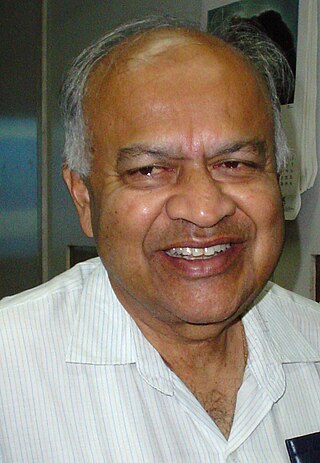
Jayant Vishnu Narlikar is an Indian astrophysicist and emeritus professor at the Inter-University Centre for Astronomy and Astrophysics (IUCAA). He developed with Sir Fred Hoyle the conformal gravity theory, known as Hoyle–Narlikar theory. It synthesises Albert Einstein's theory of relativity and Mach's principle. It proposes that the inertial mass of a particle is a function of the masses of all other particles, multiplied by a coupling constant, which is a function of cosmic epoch.
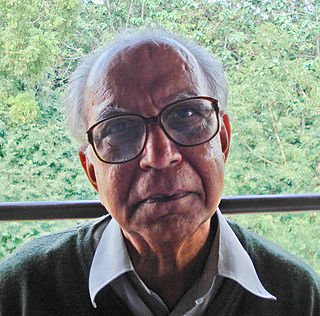
Mudumbai Seshachalu NarasimhanFRS was an Indian mathematician. His focus areas included number theory, algebraic geometry, representation theory, and partial differential equations. He was a pioneer in the study of moduli spaces of holomorphic vector bundles on projective varieties. His work is considered the foundation for Kobayashi–Hitchin correspondence that links differential geometry and algebraic geometry of vector bundles over complex manifolds. He was also known for his collaboration with mathematician C. S. Seshadri, for their proof of the Narasimhan–Seshadri theorem which proved the necessary conditions for stable vector bundles on a Riemann surface.
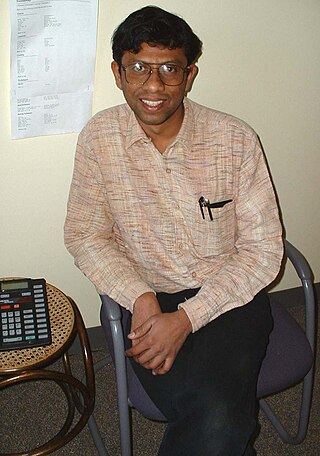
Rajesh Gopakumar is an Indian theoretical physicist and the director of the International Centre for Theoretical Sciences (ICTS-TIFR) in Bangalore, India. He was previously a professor at Harish-Chandra Research Institute (HRI) in Prayagraj, India. He is known for his work on topological string theory.

Raman Parimala is an Indian mathematician known for her contributions to algebra. She is the Arts & Sciences Distinguished Professor of mathematics at Emory University. For many years, she was a professor at Tata Institute of Fundamental Research (TIFR), Mumbai. She has been on the Mathematical Sciences jury for the Infosys Prize from 2019 and is on the Abel prize selection Committee 2021/2022.

Madabusi Santanam Raghunathan FRS is an Indian mathematician. He is currently Head of the National Centre for Mathematics, Indian Institute of Technology, Mumbai. Formerly Professor of eminence at TIFR in Homi Bhabha Chair. Raghunathan received his PhD in Mathematics from (TIFR), University of Mumbai; his advisor was M. S. Narasimhan. Raghunathan is a Fellow of the Royal Society, of the Third World Academy of Sciences, and of the American Mathematical Society and a recipient of the civilian honour of Padma Bhushan. He has also been on the Mathematical Sciences jury for the Infosys Prize from 2016.
Spenta R. Wadia is an Indian theoretical physicist with research interests in elementary particle physics, quantum field theory and statistical physics, string theory and quantum gravity. His other scientific interests are in complex systems including cross-disciplinary biology. He is a recipient of the 2004 TWAS Prize in Physics; the 1995 Physics Prize of the International Centre for Theoretical Physics (ICTP); and the J. C. Bose Fellowship of the Govt of India. He is an elected member of TWAS, and a Fellow of all the Science Academies of India.
Sundararaman Ramanan is an Indian mathematician who works in the area of algebraic geometry, moduli spaces and Lie groups. He is one of India's leading mathematicians and recognised as an expert in algebraic geometry, especially in the area of moduli problems. He has also worked in differential geometry: his joint paper with MS Narasimhan on universal connections has been influential. It enabled SS Chern and B Simons to introduce what is known as the Chern-Simons invariant, which has proved useful in theoretical physics.
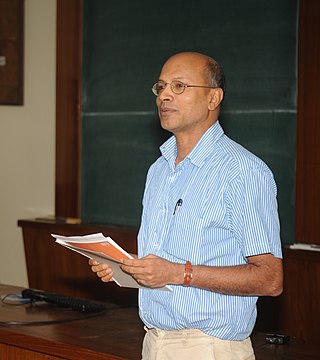
Dipendra Prasad is an Indian mathematician. He is a professor of mathematics at the Indian Institute of Technology Bombay. He is a number theorist known for his work in the areas of automorphic representations and the Gan–Gross–Prasad conjecture. He is currently the president of Commission for Developing Countries (CDC) of International Mathematics Union (2018–2022) and of Indian Math Society (2021–2022).

Vasudevan Srinivas is an Indian mathematician working in algebraic geometry. He is a Distinguished Professor in the School of Mathematics Tata Institute of Fundamental Research, Mumbai. Srinivas is an elected Fellow of the Third World Academy of Sciences, American Mathematical Society, Indian National Science Academy, and the Indian Academy of Sciences.

Kapil Hari Paranjape is an Indian mathematician specializing in algebraic geometry. He is a Professor of Mathematics at the Indian Institute of Science Education and Research, Mohali.
Badanaval Venkatasubba Sreekantan was an Indian high-energy astrophysicist and a former associate of Homi J. Bhabha at the Tata Institute of Fundamental Research (TIFR). He was also a Dr. S. Radhakrishnan Visiting Professor at the National Institute of Advanced Studies, Bangalore.
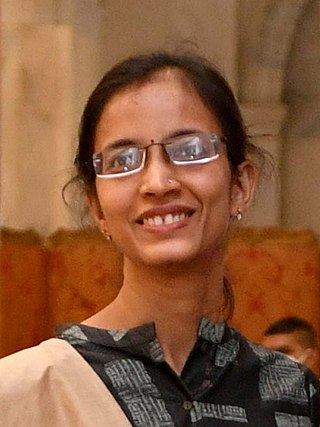
Neena Gupta is a professor at the Statistics and Mathematics Unit of the Indian Statistical Institute (ISI), Kolkata. Her primary fields of interest are commutative algebra and affine algebraic geometry.
Amalendu Krishna is an Indian mathematician in the Department of Mathematics, Indian Institute of Science (IISc), Bangalore, specializing in algebraic cycles and K-theory. He was awarded the Shanti Swarup Bhatnagar Prize for Science and Technology, India's highest prize for excellence in science, mathematics and technology, in the mathematical sciences category in the year 2016.
Vivek Shripad Borkar is an Indian electrical engineer, mathematician and an Institute chair professor at the Indian Institute of Technology, Mumbai. He is known for introducing analytical paradigm in stochastic optimal control processes and is an elected fellow of all the three major Indian science academies viz. the Indian Academy of Sciences, Indian National Science Academy and the National Academy of Sciences, India. He also holds elected fellowships of The World Academy of Sciences, Institute of Electrical and Electronics Engineers, Indian National Academy of Engineering and the American Mathematical Society. The Council of Scientific and Industrial Research, the apex agency of the Government of India for scientific research, awarded him the Shanti Swarup Bhatnagar Prize for Science and Technology, one of the highest Indian science awards for his contributions to Engineering Sciences in 1992. He received the TWAS Prize of the World Academy of Sciences in 2009.
Virendra Singh is an Indian theoretical physicist and a former C. V. Raman chair professor and director of the Tata Institute of Fundamental Research (TIFR). Known for his research in high energy physics, Singh is an elected fellow of all the three major Indian science academies - Indian National Science Academy, Indian Academy of Sciences and National Academy of Sciences, India as well as The World Academy of Sciences. The Council of Scientific and Industrial Research, the apex agency of the Government of India for scientific research, awarded him the Shanti Swarup Bhatnagar Prize for Science and Technology, one of the highest Indian science awards, for his contributions to Physical Sciences in 1973.
Sudhanshu Shekhar Jha is an Indian condensed matter physicist and a former director of Tata Institute of Fundamental Research. Known for his research in optoelectronics, Jha is an elected fellow of all the three major Indian science academies – Indian National Science Academy, National Academy of Sciences, India and Indian Academy of Sciences – as well as of The World Academy of Sciences and American Physical Society. The Council of Scientific and Industrial Research, the apex agency of the Government of India for scientific research, awarded Jha the Shanti Swarup Bhatnagar Prize for Science and Technology, one of the highest Indian science awards, for his contributions to Physical Sciences in 1979.
Deepak Dhar is an Indian theoretical physicist known for his research on statistical physics and stochastic processes. In 2022, he became the first Indian to be awarded the Boltzmann Medal, the highest recognition in statistical physics awarded once every three years by IUPAP, for exceptional contributions to the subject.
Deepak Mathur is an Indian molecular and atomic physicist and was a Distinguished Professor at the Tata Institute of Fundamental Research. He has been the J C Bose National Fellow at the Department of Atomic and Molecular Physics at Manipal Academy of Higher Education and Founding Director of the UM-DAE Centre for Excellence in Basic Science at the University of Mumbai. Known for his research on molecular and biological physics, Mathur is an elected fellow of the Indian Academy of Sciences, Indian National Science Academy and The World Academy of Sciences. The Council of Scientific and Industrial Research, the apex agency of the Government of India for scientific research, awarded him the Shanti Swarup Bhatnagar Prize for Science and Technology, one of the highest Indian science awards, for his contributions to physical sciences in 1991. Amongst other awards, he has been the Royal Society's Guest Fellow at Oxford University and winner of the European Union's Erasmus-Mundus prize in optical science which he held at Imperial College London. Currently he is an adjunct professor at Manipal Academy of Higher Education and is also learning to fly. His initial training was on a Grob G-115 2-seater training aircraft but he has now moved on to flying PA-28 4-seater aircraft.
Anish Ghosh is an Indian mathematician specialising in ergodic theory, Lie groups and number theory. He is a Professor in the School of Mathematics of the Tata Institute of Fundamental Research (TIFR), Mumbai. He was awarded the Shanti Swarup Bhatnagar Prize for Science and Technology in Mathematical Sciences in the year 2021. Anish Ghosh is also a part of the INFOSYS-Chandrasekharan Virtual Centre for Random Geometry which is a group of scientists at TIFR Mumbai and ICTS Bengaluru working on topics related to random geometry.










